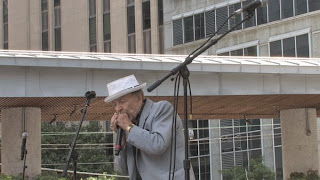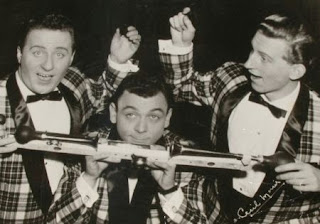Rhythm Willie - USA
Biography
Rhythm
Willie was a harmonica player active in the Chicago area of
the United States. Willie was first advertised in Chicago newspapers in
October 1938, where he was often touted as "King Of The Harmonica" or
"The Harmonica Wizard. Willie performed in nightclubs in the Chicago area,
such as the Club Delisa and the Rhumboogie Café. Willie
made his recording debut in 1939, accompanying blues pianist Peetie
Wheatstraw on five sides. Willie's distinctive harmonica playing is easily
noticeable above Wheatstraw's piano. On the same day, Willie accompanied blues
musician Lee Brown on four sides. Willie made his first recordings as leader in
October 1940, cutting four sides, all of them instrumental, showcasing Willie's
ability on the harmonica. After this session, Willie would not return to the
recording studio until 1947, accompanying Earl Bostic and his
orchestra. None of the recordings from this session were issued. Willie made
his final recordings in 1950, where he led an orchestra on two sides. Willie
continued playing live after his final recording session, and was advertised as
having played in the months leading up to his death. Willie died in early 1954
at the age of 43. An obituary in the Chicago Defender, gave his
funeral date as May 18, 1954.
Harmonica
Pioneers: Rhythm Willie
Harmonica jazz pioneer Rhythm Willie
(1905 or 1910 – 1954)
Based in Chicago, Willie Hood remained an enigma for a long period of time before a few harmonica and blues fans did the digging. This is the only picture we have of him. He recorded a couple of tunes in the 1940s mostly jazz oriented that he was playing on the diatonic. He uses the harmonica in it’s simplest form but in a very effective way that is strongly influenced by clarinet intonations as we can hear below. This version of St James infirmary is in G and played on a Bb diatonic harmonica most exclusively using the high register from hole 6 to 10. At times you could be lead to believe some notes are bent but they are just attacked differently. Willie Hood, known as Rhythm Willie the Harmonica Wizard, was a popular entertainer in Chicago, up until his death in 1954. His repertoire consisted of jazz-tinged blues and, apparently, pop standards of the time. Here, I have transcribed the opening measures to three of the tunes he recorded at a 1940 session, issued under the name "Rhythm Willie and his Gang". These tracks have been reissued on "Harmonica Blues 1929 - 1940" (Wolf Records WSE106). "Boarding House Blues" is a typical example of Willie's first position jazz style (everything he recorded, with the exception of "Breathtakin' Blues" was played in first position, or straight harp), played here on a G harp. Upper octave first position is often referred to as "Jimmy Reed style", but Willie was playing in this style in the 30s (or maybe even earlier) with a degree of sophistication that Jimmy Reed never achieved.

Bedroom Stomp" is something of an
oddity. Again in first position, this time he is using a C major harp to play
in the key of C minor! If you work on this one, pay attention to the blow bends
- if you don't get them right, the tune will sound horrible."
Another minor key tune,
"Breathtakin' Blues", is the only pre-war harp recording I have found
played in fourth position - in this case, G minor on a Bb harp. Fourth position
is the relative minor to first position, so Willie may have been more familiar
with this position, than players whose specialty was cross harp. The tune
itself is basically "St. James Infirmary", a favorite tune of early
jazz musicians - this just goes to show that Howard Levy was not the first to
try to play jazz on the 10-hole! It sounds to me like Willie had listened to a
lot of jazz clarinet players - listen to that pure tone, that controlled
vibrato and those trills, turns and bent notes.






























































